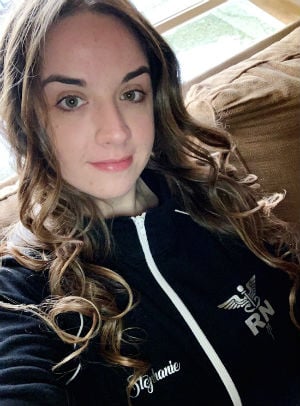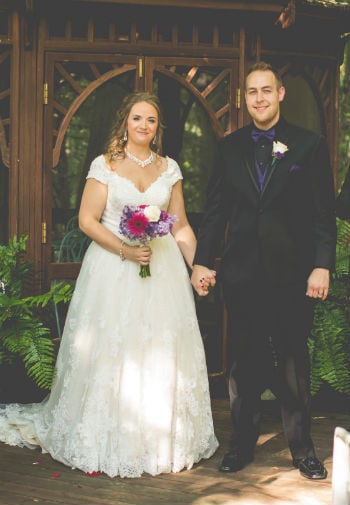
When she’s not working at the hospital or preparing for grad school, Stephanie Pelarski likes playing video games with her family.
“We have a Nintendo Switch, so my husband can play, I can play, my 9-year-old can play, and the dogs can just run around and bother us while we’re playing,” said Pelarski, recent graduate of the Eastern Michigan University (EMU) online RN to BSN program.
It’s not all fun and games for Pelarski, though. As a full-time nurse in the surgical intensive care unit at Ascension St. John Hospital in Detroit, she is also studying for her Critical Care RN certification and preparing for a nurse anesthesia doctoral program.
Leveling Up
Pelarski laid the foundation for a nursing career by earning her Associate Degree in Nursing (ADN) from Washtenaw Community College.
She lost no time before enrolling in EMU’s online RN to BSN once she found a job in 2017. Taking one course at a time, she finished the program in March 2019. The “BSN” after her name became official when she graduated in May.
That day couldn’t come soon enough for Pelarski whose grad school applications all require a BSN. Her goal is a Nurse Anesthesia Doctor of Nursing Practice (DNP) degree from the University of Detroit Mercy, one of a handful of Michigan schools offering a nurse anesthesiology program she wants to pursue.
The online format was crucial for Pelarski who works full time while raising her 9-year-old daughter, Lily, with her husband, Chris. In her limited spare time, she enjoys hanging out with her five dogs, watching her daughter’s soccer games and playing Mario Kart with her family.
The Competitive Edge

Pelarski, an Ann Arbor native, considers a BSN important based on her observation of “the associate degree not being enough anymore,” which mirrors a nationwide trend in healthcare hiring. From her own experience job hunting, she found some hospitals in her hometown weren’t hiring nurses without a BSN.
“In Ann Arbor, they won’t even let you come into ICU without your BSN,” she said. “There’s a question on their application, ‘Do you have your BSN? Yes or no?’ If you click ‘no,’ they’re like, ‘Sorry, but we’re not taking anyone without a BSN at this time.’
“The BSN is valuable because you can go to whatever hospital you want. [With a BSN], you’re not going to be weeded out because you only have your associate degree. So it gives you more opportunity for the future.”
Moreover, the RN to BSN bridge program is a stepping stone to the DNP for Pelarski.
Practice Makes Perfect
Pelarski advises students considering EMU’s online RN to BSN to be prepared for the practice experience requirement. A precepted practice experience is required at the end of the program.
“Some people don’t know about that capstone piece. So it’s important that they’re aware,” she said.
Completing the capstone in the RN to BSN program required Pelarski to be resourceful. It was up to her to locate a healthcare site where she could gain population-focused practice experience. A natural at networking, she didn’t have to go far. She completed it right where she worked, but in a different unit.
“I was able to reach out to the educator on my old [nephrology] unit, so it worked out,” she said. “But I know that a lot of students don’t have connections like that.”
For her clinical experience, she researched ways to implement better education materials for dialysis patients.
Pelarski, who researched other programs before landing on EMU, says the degree is a good value and was well worth the extra effort.
“I also got grants through Eastern for being a good student in community college. Because I went to Eastern and was already working, I was able to not take out any student loans and just pay for it all.”
Favorite Courses
Of all the courses in the program, Pelarski particularly enjoyed a human trafficking course for its focus on a devastating local problem. “Being in Michigan, we’re right next to the border of Canada. There’s a higher incidence of human trafficking in this area. It was very helpful to learn about that and to research it.”
She found the course empowering for the insight she gained to recognize the problem, bring attention to it and keep it from happening.
She values EMU’s RN to BSN program for a few additional reasons. It gave her the methodology and tools to apply and implement research in her nursing, elevating the quality of care she provides.
“The program has taught me how to research, and what the current research says in regard to current nursing practice,” she said.
It also prepared her for leadership responsibilities away from the bedside, such as participating in the nursing council at her hospital.
Another key takeaway for Pelarski was learning how to structure, write and format papers in APA style, a skill that will come in handy when she’s a graduate student. Having lost points for spacing and capitalization errors in her RN to BSN papers, she suggests the formatting tool PERRLA as an aid for students who may not have much current experience writing papers.
One Lap at a Time
Pelarski found that taking one class at a time offered a mix of work, study and personal time that suited her well. She spent five to eight hours per week on coursework.
“Just do it. You’re able to work, you’re able to manage your family and you’re able to give it time,” says Pelarski to anyone considering the online RN to BSN program.
“So a term’s only seven weeks, then it switches to a new path and you’re able to chip away at that degree.”
Way to play the game!
Learn more about EMU’s online RN to BSN program.
